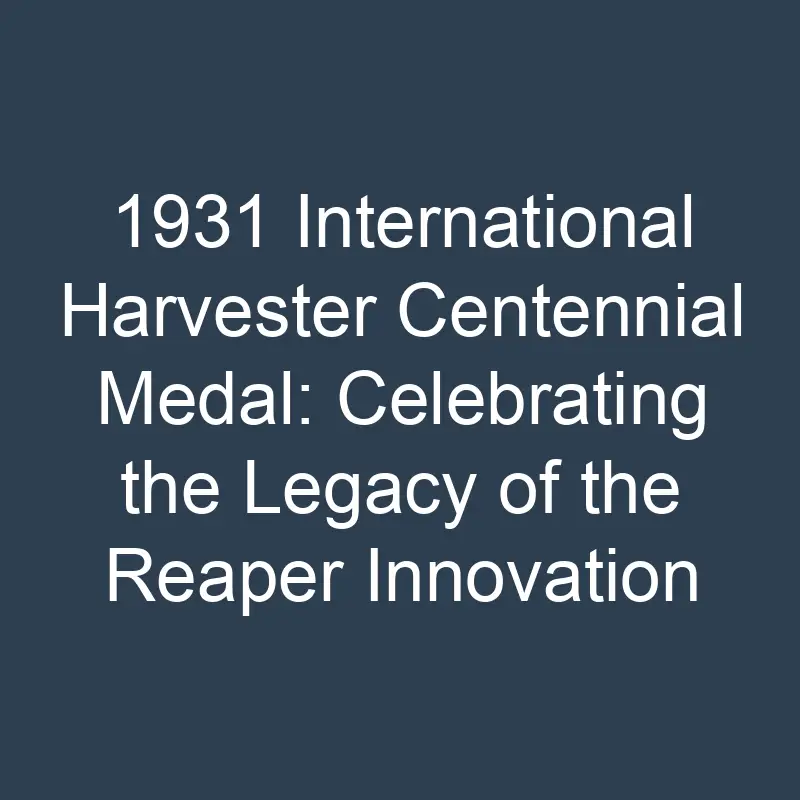
In 1931, the International Harvester Company commemorated the centennial of the reaper with a remarkable medal. This historic token pays homage to the revolutionary invention that forever changed the landscape of agriculture. We delve into the significance of this prestigious medal and its enduring legacy in the farming industry. Join us as we uncover the story behind this iconic piece of history and its impact on modern farming practices.
History of the International Harvester Company
The International Harvester Company was a prominent manufacturer of agricultural equipment that played a pivotal role in shaping modern farming practices. Established in 1831 as the Cyrus Hall McCormick Company, it later merged with other companies to form the International Harvester Company in 1902.
- The company was known for its innovative machinery, including the renowned reaper that revolutionized the harvesting process.
- Throughout its history, International Harvester produced a wide range of agricultural tools and vehicles, making farming more efficient and productive.
In 1985, the company reorganized and became Navistar International Corporation, focusing on manufacturing trucks and engines. Despite this transition, the legacy of the International Harvester Company continues to influence the agriculture industry to this day.
The Invention of the Reaper
In 1831, Cyrus Hall McCormick revolutionized agriculture with the invention of the mechanical reaper. This groundbreaking device significantly increased the efficiency of harvesting crops, transforming the farming industry forever.
McCormick’s reaper was a game-changer, allowing farmers to harvest grain more quickly and effectively than ever before. Its innovative design and functionality made it a vital tool for increasing productivity on farms across the United States.
The introduction of the reaper not only streamlined the harvesting process but also had a profound impact on the agricultural landscape, paving the way for further advancements in farming technology. The success of McCormick’s invention laid the foundation for the unparalleled legacy of the International Harvester Company in agricultural innovation.
The Centennial Commemoration
In 1931, the International Harvester Company celebrated the centennial of the reaper’s invention with a special commemorative medal. This medal was created to honor Cyrus Hall McCormick’s groundbreaking contribution to agriculture and the profound impact it had on farming practices. Crafted with exquisite detail, the medal served as a tangible symbol of the reaper’s enduring legacy and the company’s dedication to innovation.
The 1931 International Harvester centennial medal featured intricate engravings depicting the mechanical reaper in action, showcasing its significance in revolutionizing grain harvesting. This collectible item served as a cherished memento for those involved in the agricultural industry and enthusiasts passionate about farming history. Through this commemorative piece, the company paid homage to McCormick’s ingenuity and the transformative effect of his invention on generations of farmers.
As part of the centennial celebrations, the International Harvester Company organized various events and exhibitions to educate the public about the history of the reaper and its evolution over the past century. These initiatives not only highlighted the technological advancements in agriculture but also underscored the company’s ongoing commitment to pushing the boundaries of innovation in farming equipment.
The 1931 International Harvester centennial of the reaper medal remains a prized artifact for collectors and historians, serving as a reminder of the pivotal moment in agricultural history when McCormick’s invention forever changed the landscape of farming. This commemoration not only reflects on the past achievements of the industry but also inspires future generations to continue pushing the boundaries of agricultural innovation.
Design and Symbolism of the Medal
Upon closer inspection, the 1931 International Harvester centennial medal stands out for its intricate design and profound symbolism. Crafted with care, the medal showcases Cyrus Hall McCormick’s mechanical reaper in full glory, capturing the essence of his groundbreaking invention. The detailed engravings skillfully depict the reaper in action, illustrating its pivotal role in revolutionizing grain harvesting practices globally.
Embodying the spirit of innovation and progress, the medal serves as a powerful symbol of agricultural advancement. The meticulous craftsmanship involved in creating the medal reflects the Company’s dedication to honoring McCormick’s legacy and celebrating the impact of his invention on farming practices. Each element of the design, from the depiction of the reaper to the surrounding imagery, encapsulates the significance of the centennial commemoration.
Furthermore, the symbolism embedded in the medal extends beyond its physical appearance. It serves as a tangible reminder of McCormick’s visionary contribution to agriculture and his lasting influence on the industry. By awarding this prestigious medal, the International Harvester Company not only acknowledges the past but also inspires future generations to continue pushing the boundaries of agricultural innovation.
In essence, the design and symbolism of the 1931 International Harvester centennial medal encapsulate the legacy of Cyrus Hall McCormick and the enduring impact of his mechanical reaper on the evolution of farming practices worldwide.
Legacy and Impact on Agriculture
When it comes to the 1931 International Harvester centennial of the reaper medal, its significance extends far beyond a mere commemorative piece. This medal stands as a beacon of innovation and revolultion in the agricultural industry, embodying the spirit of progress and dedication to advancing farming practices.
Cyrus Hall McCormick’s mechanical reaper, immortalized in this centennial medal, has left an indelible mark on agriculture worldwide. The legacy of the reaper lies in its ability to streamline grain harvesting processes, making them more efficient and cost-effective. As a result, McCormick’s invention has not only increased productivity but has also played a crucial role in shaping modern farming techniques.
The impact of the reaper on agriculture cannot be overstated. By revolutionizing grain harvesting practices, it has allowed farmers to significantly boost their crop yields, leading to improved food security and economic growth. Moreover, the reaper’s influence continues to be felt today, as it has paved the way for further innovations in agricultural machinery and technology.
In essence, the 1931 centennial medal serves as a powerful reminder of McCormick’s visionary contribution to agriculture and his enduring legacy. It symbolizes the spirit of innovation that drives progress in the agricultural sector, inspiring future generations to build upon his work and continue to advance farming practices for years to come.
Key Takeaways
- International Harvester Company commemorated the centennial of the reaper in 1931 with a special medal.
- Cyrus Hall McCormick’s invention of the mechanical reaper revolutionized agriculture in 1831.
- The medal crafted by International Harvester Company symbolizes innovation and progress in farming practices.
- The significance of the 1931 centennial medal extends to inspiring future agricultural innovation.
- The legacy of the reaper and its impact on agriculture worldwide are highlighted through this commemorative piece.
Conclusion
The 1931 International Harvester centennial of the reaper medal stands as a timeless tribute to Cyrus Hall McCormick’s revolutionary mechanical reaper. This medal encapsulates the spirit of innovation and progress in agriculture, showcasing the transformative impact of McCormick’s invention on global grain harvesting. As we reflect on McCormick’s visionary contribution, we are reminded of the essential role that the reaper played in shaping modern farming practices. The enduring legacy of this medal serves as a beacon of inspiration for future generations, urging us to continue pushing the boundaries of agricultural technology and sustainability. In honoring McCormick’s legacy, we celebrate the profound influence of the reaper on food security, economic development, and the ongoing evolution of farming techniques.
Frequently Asked Questions
What is the significance of the 1931 International Harvester centennial medal?
The 1931 International Harvester centennial medal symbolizes innovation and progress in the agricultural industry, celebrating Cyrus Hall McCormick’s mechanical reaper’s legacy in revolutionizing global grain harvesting practices.
How did McCormick’s mechanical reaper impact the agricultural industry?
McCormick’s invention streamlined harvesting processes, increasing productivity, and shaping modern farming techniques, making a significant contribution to the agricultural industry’s development.
What does the medal represent in terms of agricultural history?
The medal serves as a powerful reminder of Cyrus Hall McCormick’s visionary contribution to agriculture, inspiring future generations to continue advancing farming practices and technologies.
Why is the legacy of the mechanical reaper still relevant today?
The enduring influence of the mechanical reaper on food security, economic growth, and ongoing innovations in agricultural machinery and technology makes its legacy relevant and impactful in modern times.





![Castle Rushen Clock 20p [Value, Rarity and Design]](https://becoincollector.com/wp-content/uploads/2022/12/Castle-Rushen-Clock-20p-768x433.jpg)
